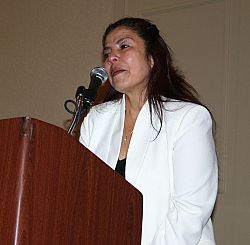DCCW Convention called emotional, powerful

SALT LAKE CITY — Human trafficking and pornography were the topics presented to more than 200 women attending the 84th annual Diocesan Council of Catholic Women (DCCW) Convention at the Hilton Salt Lake City Hotel April 21-22. The Wasatch Deanery hosted the event themed "Campaign for Human Dignity – Love in Action." Keynote speaker Maria Suarez spoke of horrors of being a victim of human trafficking and how she is now an advocate for women. Jean Hill, diocesan Peace and Justice Commission director and Diocese of Salt Lake City government liaison, followed Suarez with information about what Catholics can do to help combat the problem of human trafficking. National Council of Catholic Women past president Bobbie Hunt, a parishioner of Saint Rose of Lima Parish in Layton, and member of the Executive Committee of Religious Alliance Against Pornography, spoke about how Catholics can safeguard against pornography. Monsignor J. Terrence Fitzgerald, vicar general emeritus, gave a presentation on the Most Rev. John C. Wester’s recent ad limina visit in Rome with Pope Benedict XVI. "I think our speakers were absolutely fantastic," said Michael O’Shea DCCW president. "Maria Suarez was sincere and so real. I have never in all of my conventions seen a more listening and emotionally engaged audience. We put little points of light in between each dark topic to brighten the day. The points of light indicated that we are the only ones who can make a difference." Delfina Cook, Saint Rose of Lima parishioner and Northern Deanery president, thought the talks were extremely emotional but very necessary, she said. Suarez entered the U.S. legally from Mexico at age 15, not knowing English, to live with her sister. Two weeks later she was approached by a woman who said she could get Suarez a job, but not to tell anyone. Suarez was sold for $200 to a 68-year old man who imprisioned her, beat and raped her and emotionally, physically and spiritually tortured her. Five years later, her captor was murdered by another man, but Suarez was implicated in the crime because she hid the murder weapon. Suarez was convicted of conspiracy to commit murder and spent almost 23 years in prison. There she learned English, received a GED and enrolled in college courses. After two decades of incarceration, the Board of Prison Terms determined she was a victim of extreme violence, abuse and torture and recommended her release. "But I wasn’t free," she said. Although immigration laws determined that she should be deported, she was granted a temporary visa as a victim of human trafficking. In 2008, she became a permanent resident of the United States. Fighting back tears as she spoke, she said she isn’t sorry about what happened to her because now she can help others as a social worker and advocate for women and human trafficking victims. "The emotions of human trafficking are like a chain around your brain. A victim can’t leave or get out of the situation," Suarez said. Trafficking humans refers to all acts related to the transport and sale of individuals through force for the purpose of exploitation, said Hill. "It is about forcing someone into sex or forced labor of some kind without pay with threats of killing the victim’s family. It happens in Utah, the U.S. and around the world and unfortunately is the second-fastest growing criminal enterprise in the world; the first being the drug trade." Of the estimated 27 million trafficking victims worldwide, 80 percent are women and girls, Hill said adding that 100,000 children in the U.S. are exploited into sex labor every year. Eighty-three percent of confirmed sex trafficking victims in the U.S. are U.S. citizens; most confirmed labor trafficking victims are undocumented immigrants." Hill suggested a solution might be for consumers to purchase fair trade products such as coffee, chocolate and handcrafted items like scarves. "When we pay attention to what we are buying, we stop at least some of the labor trafficking that goes on," Hill said. Hunt also offered suggestions Catholics can take to protect their families from pornography. The family of the addict suffers and in order for an addict to stop, the addict must admit the problem and decide to get well, Hunt said. "Unfortunately, pornography will never be eliminated, so we must become more aware of its impact on the family and society and be ever vigilant when it comes to our children," Hunt said. "Talk to your children, monitor their Internet use, have safeguards put on their cell phones and know their passwords. Secure television and satellite radios and screen all movies. Spend quality time with your children and have open and honest conversations with them about God’s glorious plan for creating males and females and the beauty of our human dignity and sexuality." On a lighter note during the convention, Msgr. Fitzgerald said the purpose of Bishop Wester’s ad limina visit was to have Mass at the tombs of Saints Peter and Paul, to meet with Pope Benedict XVI and to present a report of the history of the diocese. The report included information about Bishop Wester’s activities as bishop, as well as many other topics such as missionary efforts, pastoral care of the family, evangelization efforts, social justice, works of charity, pastoral care of migrants, care for the artistic and historic pattern of the church, financial status and the general outlook for the future.
© Copyright 2024 The Diocese of Salt Lake City. All rights reserved.

Stay Connected With Us